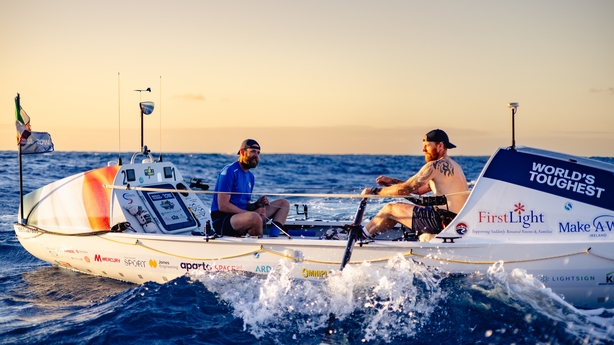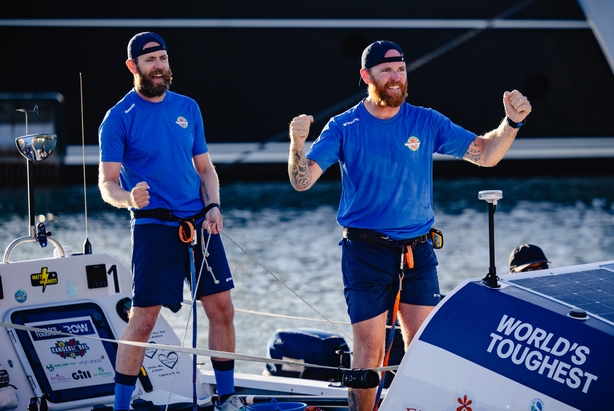The blisters start on day one, the Breen brothers say. "Big, bubbly filled blisters", like you've been in the garden all day digging. Rowing across the Atlantic, however, doesn't afford much downtime to let those sores heal.
By day two, they start to go down, they say, but then there's the sea sickness, the kind of which you can never train yourself out of feeling.
Stuck somewhere between the Canary Islands and Antigua, you have no choice but to keep rowing.
"The longer you try and let that impact you and you stop doing something, the longer you're going to be out there for and it's going to get more painful", says Eamon Breen.
"There's these things that will get in the way, how quickly can you put a resolution in there for whatever it be, whether it be your body or your mind or the physical boat?"

Eamon and Andrew Breen, two brothers from Arklow, have just completed a mammoth transatlantic row, following in the footsteps of another pair of brothers who, in 1997, rowed across the Atlantic, covering 3,000 miles in 58 days.
The Breen brothers, however, be it by design or chance, bested that celebrated achievement by 16 days, rowing from La Gomera in the Canary Islands to Antigua in 42 days.
They rowed as part of World's Toughest Row, an international race with over 30 teams, and fundraised for Make a Wish and First Light, a charity supporting families affected by Sudden Infant Death Syndrome (SIDS).
Their boat, Rory, was named for their older brother who passed away from SIDS at 10 weeks.
Speaking days after hitting dry land, Andrew called the feeling of crossing the finish line and seeing familiar faces "pretty electric".
"It's pretty surreal having nothing around you, bar open blue water and no way of getting out at any time", he added. "It immediately deleted all the pain it went through for six weeks by just having that one moment."
Andrew has been carrying the dream of that moment around with him for "20 odd years". Already a rower, he felt this was the logical next step as an athlete. There was no soul-searching, no grand philosophical itch that needed scratching.
"I didn't see anything past that. There was no journey involved for me or trying to find something, I didn't have anything to find", he says.
Eamon eventually came on board, but says he "didn't know what I was saying".
"Neither of us did a little bit of homework and a little bit of research and digging into it and probably looked and said, it's going to be really tough, but it's not something that's impossible."
Eamon has a steady athletic track record himself, having run from Dublin to Donegal in one particularly notable challenge with some friends. "I just like doing things, not that people would say is impossible, but [where] there's an air of, ah you couldn't do that", he says. "Well, I'll show you."
"That's generally how I work in life and work at family and stuff like that. Don't say no unless you've actually tried it."
With both brothers already fit and active, there was less focus on preparing physically than mentally, with the daunting task of rowing in open water for 12 hours a day, for six weeks, facing them.
It left little room for mistakes or sitting on your laurels. "You need to be so self sufficient that if anything on that boat was to break you need to be able to fix it, solve the problem quickly and move on", Andrew says.
A challenge like this poses a particularly intimidating quandary, too, Eamon says. "I remember people saying to me, how can you know you're fit enough to do it? And I compare it to, if you're marathon training and you go out and do a 20 mile run, knowing the adrenaline will get me through the 26 miles on the day, there wasn't a practice row you could do to go."
Over three years, the brothers trained intensively for the row, undergoing countless inspections of the boat, checklists and everything in between. They felt they were watertight on that end.
But, Andrew says, "That changed very quickly as soon as the event starts."

If you're going to be clipped into a row boat for six weeks with just one other person, having it be your brother could be a blessing or a curse. As for Andrew, he says he never saw it as posing a problem. With just 16 months between them, they're "near enough twins", he says.
They had also already started "Bro-ing Sunday" where they would meet every week for some extreme training, whether it's a weighted trek through the mountains or a marathon-length rowing session.
Ever the strategist, Andrew saw another benefit aside from camaraderie: "It was a thing that added in a bit of routine, because this whole thing is about routine. So you stick to what you're planning and move forward."
For Eamon, sharing the boat with his brother was easy, in many ways, not least because they eat the same foods and wear the same size clothes. "We know what the ticks are, we know how to wind up or how to react if the other person is wound up already, whether that be good or bad", he says.
Of course, it wasn't all plain sailing, and the pair saw their share of situations Andrew described as "hell on Earth".
"Within the last 70 miles was the first time I was actually admitted that I was scared of the ocean because the waves were too big", he says. "In my head, they were too big." Eamon recalls the boat being slammed with wave after wave, battling the constant threat of capsizing.
"We broke three oars in total", Andrew says. "Two in the first week and one on the last day from just getting hit by big waves."
On days like those, it would be the creature comforts that you turn to for relief, such as the teddies the brothers' kids sent across the Atlantic with them.
Describing himself as "a little bit of a loner", Andrew relished the alone time rowing, cycling through the music and audiobooks Eamon organised for the trip. By the time they reached land, he was on the fourth book for the second time.
"I used to listen to them at nighttime because I found it soothing", he says.
Eamon, however, found it more challenging: "I got lonely at some stages. I'm like my God, I can't talk to anyone. I generally don't talk to myself."
While they had WiFi to contact home, they were careful with what they told their loved ones. "You don't want to over communicate because there's only so much you want them to know at home as well because they're going to worry about it", Eamon says. "You tell them you're scared, you tell them there's big waves. What can they do exactly?"
Safely reunited with their families, the brothers are already dreaming of the parts of home they've missed: their own beds and showers, family pets, "food that you can hold and doesn't have to be eaten out of a packet with a spoon", Eamon adds.
That said, knowing them, they'll probably be planning their next Bro-ing Sunday before the flight home lands.


